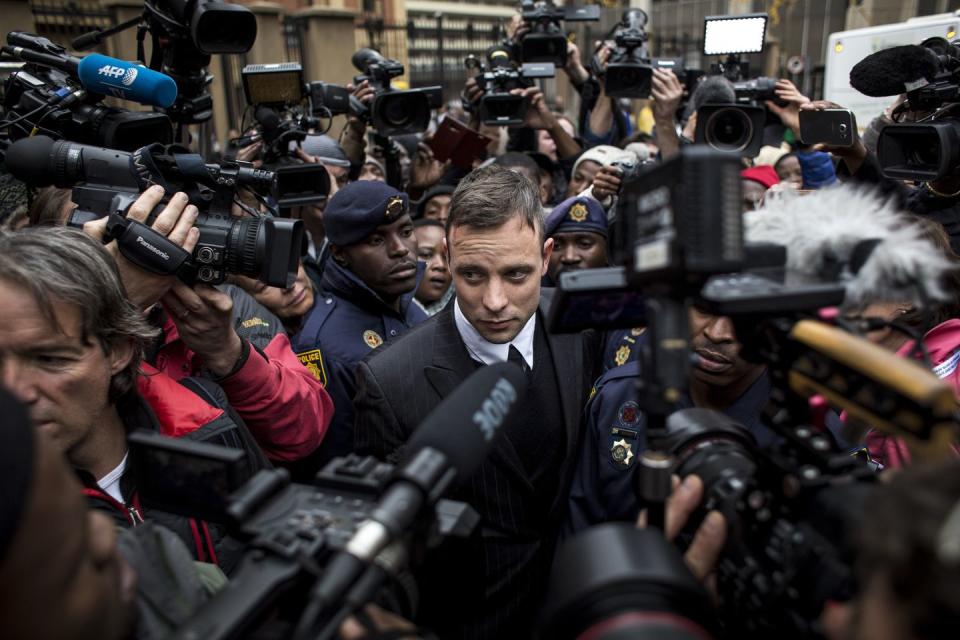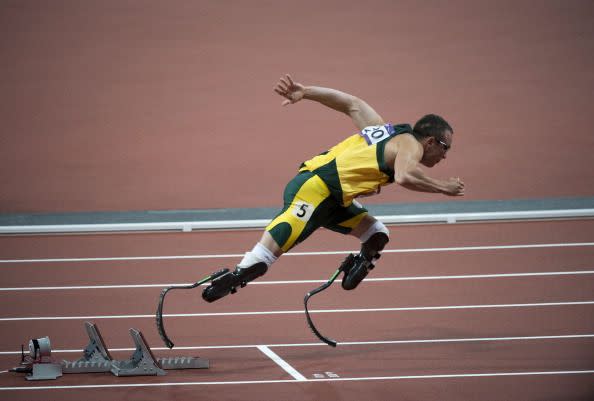Daniel Gordon on What—If Anything—Is Left for Oscar Pistorius

If you’ve watched even a few of ESPN’s 30 for 30 entries—we’ve had over a decade of episodes at this point—it wouldn’t sound crazy to argue that the thesis of 30 for 30 is the thesis of sports. There’s always a way to win, come back, or redeem yourself—however you want to put it. You can be Christian Laettner and jack up a buzzer-beater, find yourself in the low-budget depths of minor league baseball, live out the stuff you’d only see in a Disney-branded sports movie.
In the four-part, nearly six-hour-long The Life and Trials of Oscar Pistorius, director Daniel Gordon has created what might be the most devastating entries in the 30 for 30 library—because it says the exact opposite of what so many of its predecessors did. Gordon’s film, which is streaming now on ESPN+, and airing on ESPN through Wednesday, documents the death of Reeva Steenkamp by her boyfriend, former South African Paralympian and Olympian Oscar Pistorius.
If you’re unfamiliar with the story, Pistorius—whose legs were amputated below the knee when he was 11 months old—is arguably one of the most impactful Olympians of his generation. After winning several gold medals as a sprinter in the Paralympics, he fought a long battle to compete against able-bodied athletes in the 2012 London Olympics. A year later, Pistorius fatally shot his girlfriend, Steenkamp, at their home. In court, he argued that it was an accident; prosecutors said he killed her intentionally after an argument. Pistorious was found guilty of culpable homicide in 2014—the next year, that verdict was changed to murder by an appeals court. He is now serving a prison sentence of 15 years.
Beyond the true crime beats in The Life and Trials of Oscar Pistorius, Gordon asks how those who faced unimaginable tragedy recover from it. Tragedy far beyond most of what we see in the rest of ESPN’s library. The kind you wake up, fall asleep, and dream thinking about, years later. In the documentary, Gordon interviews Pistorius and Steenkamp’s loved ones, and—after you see tears and testimonies of dozens of those traumatized by Steenkamp’s death—it feels like Gordon’s saying that there’s no recovering from it. No sudden inspiration. No happy ending. You can live with what happened, survive, but there’s no getting through the sudden, horrific, and tragic loss of your daughter, sister, best friend.
If you want to trace that point to a single moment in the documentary—look no further than an anecdote by his former headmaster, Bill Schroeder, who talks about visiting Pistorius in jail at the very end of the film. To make sense of that moment, we talked to Gordon to see what he thinks of where the former athlete is in his life now.
ESQUIRE: I feel like a conversation about the documentary can’t start without Reeva Steenkamp. In all the interviews you did, was there something that you learned about her that was missed in the media coverage at the time?
Daniel Gordon: It was a big thing of mine all the way through not to forget who was really at the center of this. I met with Reeva’s parents and with family and with friends… I wanted not their support so much, but just for them to understand what I was trying to do. And it was a conscious thing for me to have Reeva all the way through this because in the media frenzy and in the salacious content of what was reported in the media aftermath and throughout the trial and everyone looking for their angles, that was kind of lost. She was lost.
We spoke to a number of people that knew her at various stages in her life—she just seemed like pretty much the most perfect person you could meet. Everyone genuinely would say she would light up the room, she would talk to anybody, she was the most amazing person you could ever meet.
ESQ: You wait until almost the very last second of the documentary to tell us how Reeva met Oscar and last show us the year in his life before the crime—which I think is more convincing against Oscar than almost anything we hear in court.
DG: I felt very, very strongly from the beginning that this was not a linear story. You cannot start at his birth, and you're all the way to 2013, and then the trial. It just didn't feel right. We never even tried it—[I] just knew that wasn't what I wanted to do.
I'm so pleased that that ending is what it is—that last half hour where all the loose ends are sort of tied up. Then you're like, They met like that? They only met like that cause your friend saw him and he needed a date? And I'm still thinking, Why would he need a date? Go on your own, mate. That's kind of like my theory, is, while watching, people forget—they always think [Oscar and Reeva] were in a relationship for years, but it was like three months. So [it was a] really, really, really quick, very intense relationship. And then it goes tragically wrong—that night and he's got all this real shit going on in his life.

ESQ: I was surprised to see the postscript through his old headmaster. It tells so much in five minutes: Oscar has a beard, he wants forgiveness, he gives this big hug. What did you make of that moment?
DG: It does so many things. And the more times I've seen the film, the more I've really appreciated how special that is. We all felt like that's the right thing, really, to summarize everything… In that moment, Bill Schroeder, it was so great in the early films to tell us about the young Oscar. Then [Oscar], out of the blue, phones and says, “Come visit me in prison.”
ESQ: I feel like it's just asking: How do you live? How do you live after that? It's almost more of an existential question that you're ending on.
DG: Completely. Well what do you do?
ESQ: You don't. He says that.
DG: You don't forget. No one else is gonna forget… This sort of wisdom comes out [from Bill Schroeder]. “You're not gonna get forgiveness from everyone—you need to forgive yourself first.” And yeah, it's an incredible line.
ESQ: There's even that line where Oscar even talks about having children. How will he? How's he gonna meet someone?
DG: Yeah. How's he gonna meet someone? How's he gonna tell his case? All these things, and it's just, as the uncle says and as the mom used to say, “A day at a time. Small steps. A day at a time.”

ESQ: You talked to so many Paralympians for the documentary. I feel like they grapple with this: You can't reverse what he did for disabled athletes everywhere. What have you grasped from the disabled community about how they've been able to weigh what Oscar did for the sport and his crimes with each other?
DG: Yeah, it's a really difficult one. I think even someone like myself on the outside, you look at it and no question that the Paralympics of 2012 was successful in terms of people watching. It was down to Oscar. He was the poster boy… Had that not happened on Valentine's Day in 2013, you just think, he would've been the poster boy of 2016, both Paralympics and Olympics. He would've been really annoyed that Tokyo was postponed. He'd be this guy that'd be ever-present in our lives
You know, he did a lot of work for landmine victims in Mozambique. Seen some stuff here in the UK where he met with a toddler who's got no arms and no legs. He was always an incredibly inspirational person for anyone in the Paralympic movement. And what I think they will struggle with how it ended, and that's what we struggle with in the film. We play these amazing moments, real spine-tingling moments, genuine greatness on the track and in life, but you know where it's gonna end up. Even if you take Oscar's version as being true, where it ends up is tragic. There's just no getting away from where his life ended.
ESQ: And you just see the pain with a couple of the Paralympians. It seems like they've still not answered that themselves.
DG: Yeah. And I think it's true for most people who know him. You know, the people that knew him well and the people that knew him in any walk of life, whether they were close and saw the temper personally or they never saw any problem whatsoever, like the family in Iceland. He was a true inspiration for them. Same in Italy—they never saw any of that coming. They're fully supportive of him and want to be there for him. And they sort of feel like he's their son in many ways, metaphorically and otherwise.

ESQ: It's impossible to separate South Africa and Pistorius’s crimes from each other. Though I'll be honest—from an American perspective, I asked myself what his conviction would have been in America, especially if he was tried in front of a jury. What would've happened if this had occurred elsewhere in the world?
DG: In terms of an actual shooting and a perceived burglar and being allowed to have a gun in your house—there are many countries where that would've happened. In that respect, that wouldn't have happened in Britain. You're now allowed to have a gun in your house. Not in easy access, you're not allowed to go around with a gun in your back pocket in England.
So that's the very South African nature of it. In terms of the jury and the judge, I think the big difference really with that worldwide is not so much the jury and the judge, but the halting of the media would be different in the UK. It would've prejudiced the trial so much in the UK, you wouldn't have been able to cover it like they covered it, and that's the big difference. So I was watching some of the news reports thinking about that—that could not happen in England because that would be the end of the trial.
ESQ: I’m curious if there’s anything in particular you struggled with unraveling in the documentary—what do you think it leaves unanswered?
DG: The main challenge for this film was how to deal with what actually happened in the early hours of Valentine’s Day 2013. And we decided we would lay out the case from both sides and let the viewer decide for themselves. And as a viewer you go back and forth as to which version you believe, depending what is presented to you at what point. If I’m asked what do I think happened—my answer remains, “It depends which part of the film I’m watching.”
You Might Also Like

